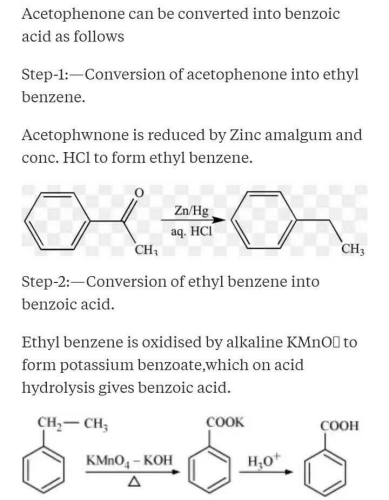NEET Exam > NEET Questions > can acetophenone be conversion to benzoic aci...
Start Learning for Free
can acetophenone be conversion to benzoic acid through iodoform?
Most Upvoted Answer
can acetophenone be conversion to benzoic acid through iodoform?
Acetophenone cannot be directly converted to benzoic acid through iodoform reaction. However, it can be indirectly converted to benzoic acid through a two-step process involving iodoform reaction and subsequent oxidation. Let's discuss the process in detail:
1. Iodoform Reaction:
The iodoform reaction is a reaction in which a methyl ketone reacts with iodine and a base to form a yellow precipitate of iodoform. Acetophenone can undergo this reaction to form iodoform (CHI3) in the presence of iodine (I2) and a strong base such as sodium hydroxide (NaOH) or potassium hydroxide (KOH). The reaction proceeds as follows:
Acetophenone + I2 + NaOH → CHI3 + NaOAc + H2O
2. Oxidation of Iodoform to Benzoic Acid:
Once iodoform is obtained from the iodoform reaction, it can be oxidized to benzoic acid. This oxidation can be achieved by treating iodoform with a strong oxidizing agent such as sodium hypochlorite (NaOCl) or potassium permanganate (KMnO4). The reaction proceeds as follows:
CHI3 + 6NaOCl → 3NaI + 3NaOAc + 3H2O + 3Cl2
3Cl2 + 6NaOH → 6NaCl + 3H2O
3NaOAc + 3H2O + 3Cl2 + 6NaOH → 3NaCl + 3NaHCO3 + 3NaCl + 3H2O
3NaHCO3 → 3NaOH + 3CO2
3NaOH + 3CO2 → 3NaHCO3
By balancing the above equations, we can see that the overall reaction is:
CHI3 + 6NaOCl + 6NaOH → 3NaI + 6NaCl + 6NaHCO3
The sodium bicarbonate (NaHCO3) produced in the reaction can be further treated with acid to obtain benzoic acid (C6H5COOH). The reaction proceeds as follows:
3NaHCO3 + 3HCl → 3NaCl + 3H2O + 3CO2
3C6H5COONa + 3HCl → 3C6H5COOH + 3NaCl
Therefore, by combining the iodoform reaction and subsequent oxidation of iodoform, acetophenone can be indirectly converted to benzoic acid.
In conclusion, acetophenone can be converted to benzoic acid through a two-step process involving iodoform reaction and subsequent oxidation. The iodoform reaction converts acetophenone to iodoform, and then the iodoform is oxidized to benzoic acid.
1. Iodoform Reaction:
The iodoform reaction is a reaction in which a methyl ketone reacts with iodine and a base to form a yellow precipitate of iodoform. Acetophenone can undergo this reaction to form iodoform (CHI3) in the presence of iodine (I2) and a strong base such as sodium hydroxide (NaOH) or potassium hydroxide (KOH). The reaction proceeds as follows:
Acetophenone + I2 + NaOH → CHI3 + NaOAc + H2O
2. Oxidation of Iodoform to Benzoic Acid:
Once iodoform is obtained from the iodoform reaction, it can be oxidized to benzoic acid. This oxidation can be achieved by treating iodoform with a strong oxidizing agent such as sodium hypochlorite (NaOCl) or potassium permanganate (KMnO4). The reaction proceeds as follows:
CHI3 + 6NaOCl → 3NaI + 3NaOAc + 3H2O + 3Cl2
3Cl2 + 6NaOH → 6NaCl + 3H2O
3NaOAc + 3H2O + 3Cl2 + 6NaOH → 3NaCl + 3NaHCO3 + 3NaCl + 3H2O
3NaHCO3 → 3NaOH + 3CO2
3NaOH + 3CO2 → 3NaHCO3
By balancing the above equations, we can see that the overall reaction is:
CHI3 + 6NaOCl + 6NaOH → 3NaI + 6NaCl + 6NaHCO3
The sodium bicarbonate (NaHCO3) produced in the reaction can be further treated with acid to obtain benzoic acid (C6H5COOH). The reaction proceeds as follows:
3NaHCO3 + 3HCl → 3NaCl + 3H2O + 3CO2
3C6H5COONa + 3HCl → 3C6H5COOH + 3NaCl
Therefore, by combining the iodoform reaction and subsequent oxidation of iodoform, acetophenone can be indirectly converted to benzoic acid.
In conclusion, acetophenone can be converted to benzoic acid through a two-step process involving iodoform reaction and subsequent oxidation. The iodoform reaction converts acetophenone to iodoform, and then the iodoform is oxidized to benzoic acid.
Community Answer
can acetophenone be conversion to benzoic acid through iodoform?


|
Explore Courses for NEET exam
|

|
Question Description
can acetophenone be conversion to benzoic acid through iodoform? for NEET 2025 is part of NEET preparation. The Question and answers have been prepared according to the NEET exam syllabus. Information about can acetophenone be conversion to benzoic acid through iodoform? covers all topics & solutions for NEET 2025 Exam. Find important definitions, questions, meanings, examples, exercises and tests below for can acetophenone be conversion to benzoic acid through iodoform?.
can acetophenone be conversion to benzoic acid through iodoform? for NEET 2025 is part of NEET preparation. The Question and answers have been prepared according to the NEET exam syllabus. Information about can acetophenone be conversion to benzoic acid through iodoform? covers all topics & solutions for NEET 2025 Exam. Find important definitions, questions, meanings, examples, exercises and tests below for can acetophenone be conversion to benzoic acid through iodoform?.
Solutions for can acetophenone be conversion to benzoic acid through iodoform? in English & in Hindi are available as part of our courses for NEET.
Download more important topics, notes, lectures and mock test series for NEET Exam by signing up for free.
Here you can find the meaning of can acetophenone be conversion to benzoic acid through iodoform? defined & explained in the simplest way possible. Besides giving the explanation of
can acetophenone be conversion to benzoic acid through iodoform?, a detailed solution for can acetophenone be conversion to benzoic acid through iodoform? has been provided alongside types of can acetophenone be conversion to benzoic acid through iodoform? theory, EduRev gives you an
ample number of questions to practice can acetophenone be conversion to benzoic acid through iodoform? tests, examples and also practice NEET tests.

|
Explore Courses for NEET exam
|

|
Signup for Free!
Signup to see your scores go up within 7 days! Learn & Practice with 1000+ FREE Notes, Videos & Tests.























